1. Spontaneous Combustion
2. Rengeo
3. Harmon Blues
4. Bitter-Jug Waltz
5. Griffin-a-ning
6. Skylark
7. Motoring Along
8. Hanging ‘round for Friday
9. Fungii Mama
10. One for D.M.
11. Cannonball
Bruce Adams - Trumpet, flugelhorn
Alan Barnes - Alto, tenor and baritone
saxes
Pascal Michaux – Piano
Alec Dankworth – Bass
Bobby Worth
- Drums
Alan
Barnes is a jazzman with a high profile, seemingly
appearing at every jazz festival in Britain
and also well-known abroad. Bruce Adams, on
the other hand, may be less familiar on the
jazz scene, as he has often worked as a session
musician. However, he and Barnes have been
friends and sparring partners for years, co-leading
various groups since 1992. And their togetherness
is evident on this new album, where they work
together well, playing an interesting variety
of material.
This
session is book-ended by two Cannonball Adderley
compositions. Spontaneous Combustion
is an exciting opener, with Adams making his
mark with some of those high notes which are
his trademark. Alan Barnes’ solo also hits
the highspots before the two play interleaving
phrases and then take the tune out in style.
The closing Cannonball is equally dynamic,
with Barnes leading the way on fluent alto
sax and Adams punching the bluesy message
home. This track includes a personable solo
from Belgian pianist Pascal Michaux but for
most of the album the rhythm section plays
with professional skill without making much
of an individual impact. Attention is focused
mainly on the co-leaders and, in truth, they
deserve the limelight.
Alan
Barnes wrote six of the eleven pieces on the
album and they exhibit his ability to compose
melodies which are immediately catchy. He
knows how to write memorably – a skill he
shares with Horace Silver, to whom he paid
tribute in his album Yeah! His composition
Rengeo contains some warm tenor sax
from Alan and nice muted trumpet from Bruce,
whose playing here and elsewhere reminds me
of Roy Eldridge. Bruce resembles Eldridge
in his irrepressible playing, which occasionally
leads him astray but – hey! – what are a few
wrong notes when you’re enjoying yourself?
Bruce’s enjoyment is infectious, as is the
humour of song titles like Bitter-Jug Waltz,
on which Bruce plays flugelhorn, managing
to avoid the sentimentality sometimes associated
with that instrument.
Bruce’s
muted trumpet in Harmon Blues (another
Barnes original) reminds me more of Harry
Edison in its allusive economy, while Barnes’
tone is very Ben Websterish. Both men play
with heartfelt feeling on Skylark,
which includes Alan doing his stuttering effect
on the baritone – something which could become
an irritating mannerism if he does it too
often. Motoring Along is a jaunty tune
which would suit an old-fashioned commercial
for motor-cars. Adams motors along cheerfully,
while Barnes’s alto negotiates some challenging
bends and Alec Dankworth’s bass solo almost
comes off the track. The bass is more comfortable
with Hanging ‘round for Friday, an
easy loping Barnes composition on which Bruce’s
muted trumpet again evokes Little Jazz, and
Alan proves that his dexterity on the baritone
is at least as great as Gerry Mulligan’s.
One for D.M. is a delicate elegy for
the late Dick Morrissey.
All
in all, another highly listenable album from
Alan Barnes’s Woodville label. Just one pedantic
niggle: how could Alan misspell Orson Welles
as "Wells" in his sleeve-notes?
Tony Augarde
